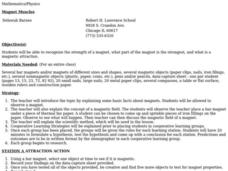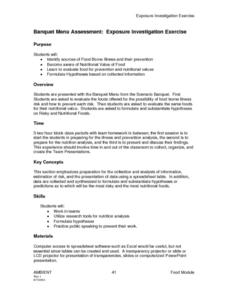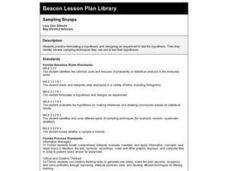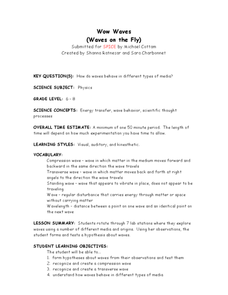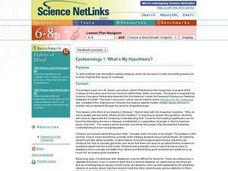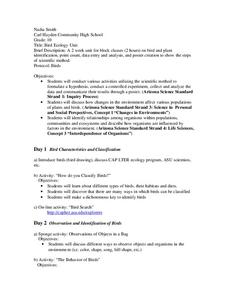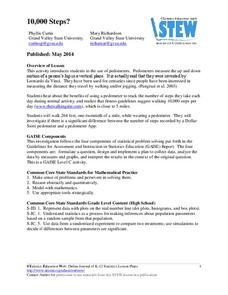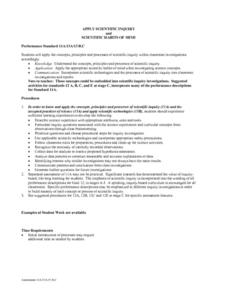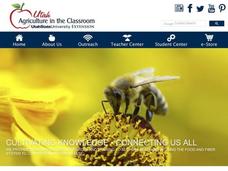Curated OER
Exploration of "Pillbugs"
Fifth graders define vocabulary terms, identify the characteristics of a pillbug, and create a dichotomous key. Then they examine the pillbugs and make observations and record these observations. Finally, 5th graders observe specific...
Statistics Education Web
Double Stuffed?
True or false — Double Stuf Oreos always contain twice as much cream as regular Oreos. Scholars first measure the masses of the filling in regular Oreos and Double Stuf Oreos to generate a class set of data. They use hypothesis testing...
Curated OER
The Egg Activity
Students comprehend the three basic steps of science: 1) Observation, 2) Statements of cause and effect (Hypotheses), and 3) Testing. By working with an egg, students are required to observe an object that is very common to them. This...
Curated OER
Magnet Muscles
Students experiment with magnetism. In this science lesson, students are divided into cooperative learning groups and use the scientific method to test their hypothesis. Each group performs a different experiment.
Statistics Education Web
I Always Feel Like Somebody's Watching Me
Future statisticians and potential psychics first conduct an experiment to collect data on whether a person can tell if someone is staring at them. Statistical methods, such as hypothesis testing, chi-square tests, binomial tests, and...
Curated OER
Testing the Hypothesis
Students create and conduct various experiments to determine the origin of a family artifact, and then determine whether their results were successful. Students summarize their results and evaluate whether their hypotheses were correct.
Curated OER
Banquet Menu Assessment: Exposure Investigation Exercise
Students identify sources of Food Borne illness and their prevention. They formulate hypotheses based on collected information. Pupils become aware of Nutrintional value of food. Students collected data are synthesized to formulate...
Curated OER
Sampling Snoops
Students practice formulating a hypothesis and designing an experiment to test the hypothesis. They identify several sampling techniques they can use to test their hypotheses.
Curated OER
Hypothesize This!
Students role play scientists to prove a hypotheses. They determine whether or not walruses stay warmer in water or in air. Students also determine in which environment they lose more body heat.
Curated OER
Floating Soap
Students explore the density of soap. In this science lesson, students conduct an experiment to find which types of soap will float. Students make a hypothesis and record their observations.
Curated OER
Wow Waves (Waves on the Fly)
Students formulate hypotheses on wave behavior and test them. In this physics lesson, students compare and contrast transverse and compression waves. They determine the wavelength of transverse waves.
Curated OER
Epidemiology 1: What's My Hypothesis?
Students demonstrate how descriptive epidemiological clues can be used to make educated guesses as to what might be the cause of a disease.
Curated OER
Close Encounters
Students investigate the cause of death of a fictitious school janitor. They develop hypotheses based on information discovered by examining the labels of household chemicals.
Curated OER
The Scientific Method, Blood Typing, and Antibiotic Resistance
Students are given some components of an experiment, where they are able to identify and fill in missing parts, such as hypothesis, conclusion, results, etc. They form a hypothesis given general scientific facts. Students apply the...
Curated OER
Bird Ecology Unit
Tenth graders conduct various activities utilizing the scientific method to formulate a hypothesis, conduct a controlled experiment, collect and analyze the data and communicate their results through a poster. They also identify...
Statistics Education Web
Consuming Cola
Caffeine affects your heart rate — or does it? Learners study experimental design while conducting their own experiment. They collect heart rate data after drinking a caffeinated beverage, create a box plot, and draw conclusions....
Statistics Education Web
10,000 Steps?
Conduct an experiment to determine the accuracy of pedometers versus pedometer apps. Class members collect data from each device, analyze the data using a hypothesis test, and determine if there is a significant difference...
Howard Hughes Medical Institute
Seed Dispersal in Tropical Forests
How do seeds get around? It's not like plants can control seed dispersal—or can they? Dig deeper into the amazing mechanisms of seed dispersal observed in tropical plants through interactives, a video, and plenty of hands-on data...
Statistics Education Web
Text Messaging is Time Consuming! What Gives?
The more you text, the less you study. Have classes test this hypothesis or another question related to text messages. Using real data, learners use technology to create a scatter plot and calculate a regression line. They create a dot...
Curated OER
Apply Scienctific Inquiry and Scientific Habits Of Mind
Students describe science experience with appropriate attributes, units, and tools. They formulate inquiry question associated with the science experiences and curricular concepts from observations through class brainstorming. Pupils...
Curated OER
Science: Conditions for Slime Mold Survival
Students perform experiments to determine the nutritional needs and physical space requirements for slime mold to survive. After formulating hypotheses, they seal the petri dishes and set up the experiment along with two controls. ...
Curated OER
Water Displacement
Students formulate a hypothesis using critical thinking skills. They use an orange to examine the displacement of water as the orange sinks or floats.
Odell Education
Scientific Process and Experimental Design
The scientific method keeps you from believing only what you want to believe — it expands your mind. The lesson introduces the eight steps in the scientific process and how to design an experiment to biology scholars. Live insects...
Curated OER
Microbe Experimentation
Sixth graders formulate a question about microorganisms that can be answered with an experiment. They develop a hypothesis for a questin about microorganisms based on observations and prior knowledge. Pupils carry out an investigation on...



